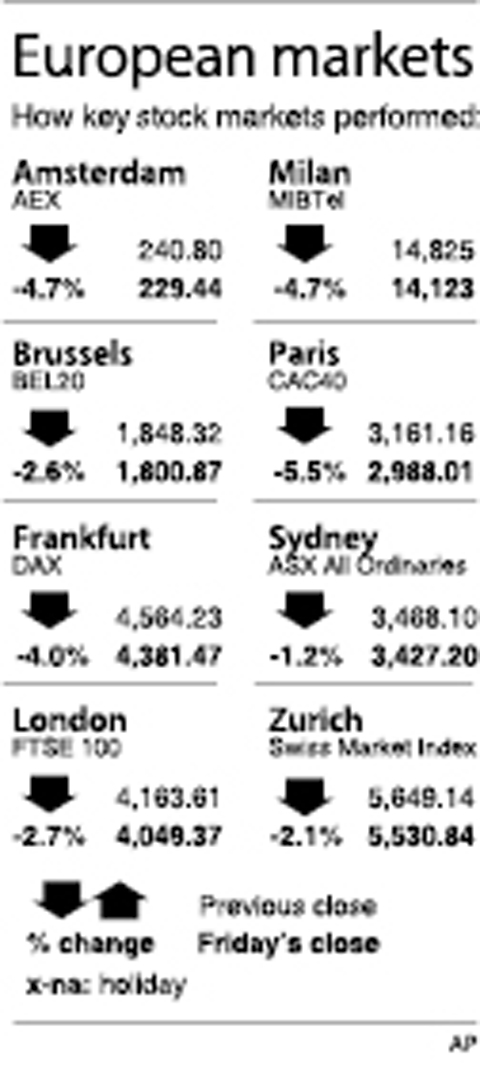European stocks fell this week, sending the Dow Jones STOXX 600 Index to its worst December start, after reports showed manufacturing shrank around the world and US companies cut jobs at the fastest pace in 34 years.
StatoilHydro ASA tumbled 18 percent and Xstrata PLC lost 38 percent as concern the global economic slump is deepening sent oil below US$42 a barrel and copper to the lowest level since May 2005. ABB Ltd, the largest builder of electricity grids, dropped 12 percent after factory indexes in Europe, Russia, China and South Africa showed record contractions. Infineon Technologies AG, Europe’s second-largest chipmaker, plunged the most in the STOXX 600 on a forecast that revenue will decline.
The STOXX 600 retreated 8 percent this week to 189.84, bringing its decline this year to 48 percent. The index erased more than half of a 13 percent rally last week spurred by speculation government stimulus packages and interest-rate cuts would cushion economies from the financial crisis.

“Investors are being blown around in the wind,” Roger Nightingale, who helps oversee about US$1.1 billion as a London-based strategist at Pointon York Ltd, said in an interview on Bloomberg Television. “The only thing that has been consistent is the economic data, and that is horrible. There isn’t really a single piece of good data out there.”
European Central Bank (ECB) President Jean-Claude Trichet predicted this week the euro region’s economy will shrink next year. The ECB delivered the biggest interest rate cut in its 10-year history and the Bank of England cut its benchmark rate to the lowest level since 1951. Sweden also lowered borrowing costs by the most since 1992 as central banks around the world struggle to stem job losses and revive credit markets.
The STOXX 600’s drop was the steepest for the first week of December since price data began. The index has posted an average December gain of 2.2 percent during its 21-year history, rising two-thirds of the time, according to monthly data compiled by Bloomberg.
National benchmark indexes fell in all 18 western European markets except Iceland.

FREEDOM OF NAVIGATION: The UK would continue to reinforce ties with Taiwan ‘in a wide range of areas’ as a part of a ‘strong unofficial relationship,’ a paper said The UK plans to conduct more freedom of navigation operations in the Taiwan Strait and the South China Sea, British Secretary of State for Foreign, Commonwealth and Development Affairs David Lammy told the British House of Commons on Tuesday. British Member of Parliament Desmond Swayne said that the Royal Navy’s HMS Spey had passed through the Taiwan Strait “in pursuit of vital international freedom of navigation in the South China Sea.” Swayne asked Lammy whether he agreed that it was “proper and lawful” to do so, and if the UK would continue to carry out similar operations. Lammy replied “yes” to both questions. The

‘OF COURSE A COUNTRY’: The president outlined that Taiwan has all the necessary features of a nation, including citizens, land, government and sovereignty President William Lai (賴清德) discussed the meaning of “nation” during a speech in New Taipei City last night, emphasizing that Taiwan is a country as he condemned China’s misinterpretation of UN Resolution 2758. The speech was the first in a series of 10 that Lai is scheduled to give across Taiwan. It is the responsibility of Taiwanese citizens to stand united to defend their national sovereignty, democracy, liberty, way of life and the future of the next generation, Lai said. This is the most important legacy the people of this era could pass on to future generations, he said. Lai went on to discuss

MISSION: The Indo-Pacific region is ‘the priority theater,’ where the task of deterrence extends across the entire region, including Taiwan, the US Pacific Fleet commander said The US Navy’s “mission of deterrence” in the Indo-Pacific theater applies to Taiwan, Pacific Fleet Commander Admiral Stephen Koehler told the South China Sea Conference on Tuesday. The conference, organized by the Center for Strategic and International Studies (CSIS), is an international platform for senior officials and experts from countries with security interests in the region. “The Pacific Fleet’s mission is to deter aggression across the Western Pacific, together with our allies and partners, and to prevail in combat if necessary, Koehler said in the event’s keynote speech. “That mission of deterrence applies regionwide — including the South China Sea and Taiwan,” he

UNPRECEDENTED: In addition to the approved recall motions, cases such as Ma Wen-chun’s in Nantou are still under review, while others lack enough signatures The Central Election Commission (CEC) announced yesterday that a recall vote would take place on July 26, after it approved the first batch of recall motions targeting 24 Chinese Nationalist Party (KMT) lawmakers and Hsinchu Mayor Ann Kao (高虹安). Taiwan is in the midst of an unprecedented wave of mass recall campaigns, following a civil society push that echoed a call made by Democratic Progressive Party (DPP) caucus whip Ker Chien-ming (柯建銘) in January to initiate signature drives aimed at unseating KMT legislators. Under the Civil Servants Election and Recall Act (公職人員選舉罷免法), Taiwanese can initiate a recall of district-elected lawmakers by collecting